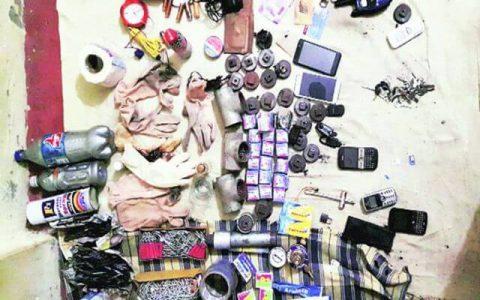
Train suspect shot dead was named last year by member of IS-inspired cell
Saifullah, the alleged Islamic State-inspired terrorist killed in a shootout with police in Lucknow on Wednesday, was appointed military head of a terror group inspired by the organisation over a year ago, a suspect held during a nationwide anti-terror sweep told the National Investigation Agency during questioning in February last year, documents with The Indian Express show.
Police and intelligence services were aware, the document shows, that the college dropout had been tasked with securing arms and training facilities for a new Islamic State-linked cell in Uttar Pradesh, sparking off months of online surveillance. But the effort lost momentum, sources said, because resources were strained as the numbers of individuals linked to the Islamic State and other jihadist groups snowballed through 2016 with over 250 individuals of interest being tracked online.
NIA investigators first came to know of Saifullah’s existence from Mudabbir Mushtaq Sheikh, a Maharashtra resident who is now being prosecuted for his alleged role as chief of the Jund-ul-Khalifa-ul-Hind, or army of the Caliph in India, an Islamic State-inspired organisation of Indian jihadists. Sheikh, an unemployed web-designer, is alleged by the NIA to have been recruited to the jihadist movement online, after losing his job in 2012.
The new organisation brought together a group of men mainly radicalised by Internet reading: in the main, middle class, and educated to at least graduate level, police records show. Half, during questioning, attributed their radicalisation mainly to global issues; another half to discrimination and violence against Muslims in India.
In October 2014, transcripts of Sheikh’s interrogation by the NIA record, he was directed to travel to Lucknow to attend the Jund-ul-Khalifa’s first organisational meeting. The orders came from his online contact in the Islamic State, Yusuf al-Hindi-code, the NIA has said in legal filings, for Shafi Armar, a Karnataka-born fugitive who served with the Indian Mujahideen before fleeing to Pakistan, and then on to Raqqa in Syria.
Held at a home in Lucknow’s Mayawati Colony area, the meeting focussed on buying weapons and establishing a facility to train members in the use of small arms, according to Sheikh’s interrogation records — which, for the purposes of his trial, are not admissible as evidence.
In an earlier meeting held in January 2015, Sheikh allegedly told the NIA under questioning, the issue had been discussed with Saifullah, who he also knew by the code-name “Ikrama”. Saifullah, Sheikh allegedly claimed, had bragged that he had found an engineering student who had identified Israeli establishments in Uttar Pradesh, and had now tasked recruits with learning Hebrew in order to be able to penetrate them.
Perhaps impressed, the interrogation records state, Sheikh claimed to have unsuccessfully nominated Saifullah for leadership of the new organisation. Believing he had been rejected because of his Barelvi-sect family background, Safiullah walked out of the meeting.
Later, though, Saifullah was appointed the organisation’s Amir-e-Askari, or military commander, Sheikh’s interrogation transcript records him as saying. The last meeting between Sheikh and the Uttar Pradesh unit came in January, 2016, when he flew to Lucknow, again on Shafi Armar’s instructions, to hand over Rs 3 lakh to an individual identified by the code-name “Malik ka Banda”, or The Boss’s Man, near the city zoo. He returned to Lucknow the same day.
Following Sheikh’s questioning, police forces in several states made multiple arrests, but only two of those present at the Lucknow meeting were tracked down: Rizwan Ahmad, a key figure linked directly to Shafi Armar, and Mohammad Alim. “Eventually, the rest of the group was identified”, a senior police official said, “but it wasn’t immediately clear that they were actually doing anything in the offline world. There were no indications that there were operational plans, like bomb-making plots, in the offing”.
The judgement was, police now believe in the wake of the Ujjain train bombing, a mistake. Funds had been found to purchase weapons recovered from Saifullah’s apartment in Lucknow, believed to have been locally manufactured for the state’s black-market. Saifullah had also obtained citizens-band radio sets, for possible use in field training. The men had also managed to make basic pipe-bombs, downloading easily-available manuals from the internet.
Source: /Indian Express





